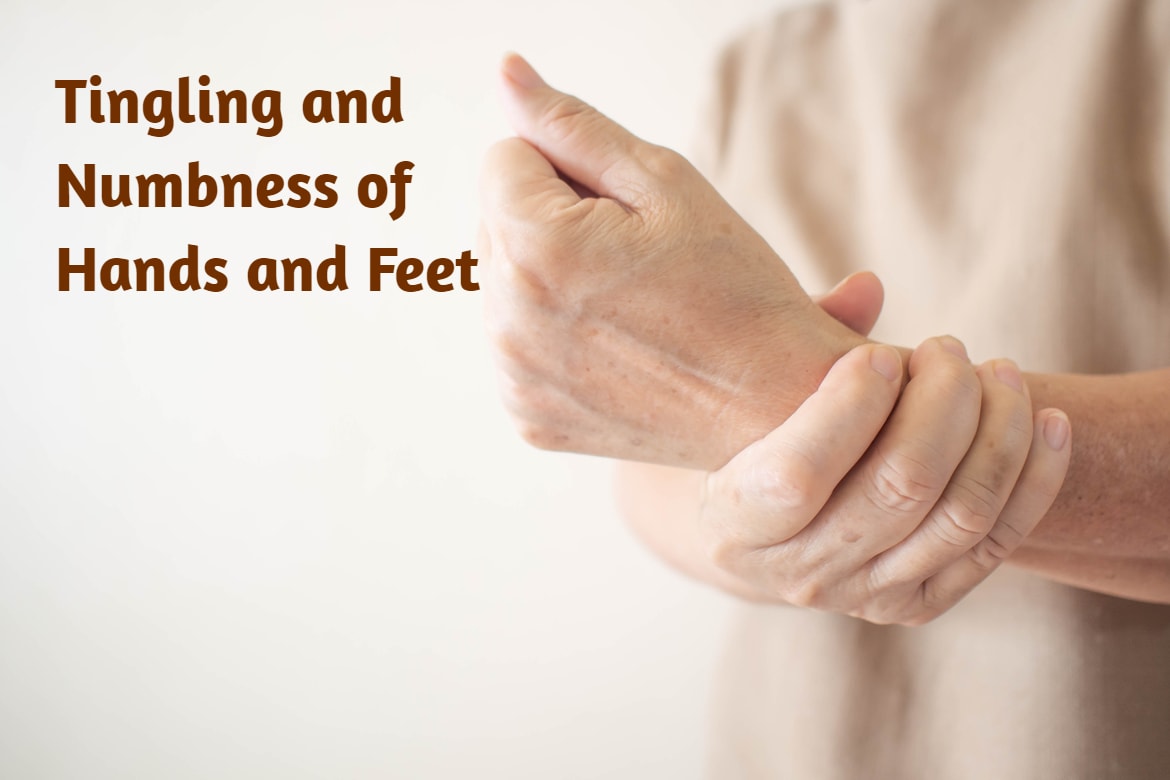Tingling and numbness in the hands or feet or both is a prevalent concern. Several people experience the so-called “pins and needles” sensation in their feet or hands at some point in their lives. Frequently, you may feel pain in feet or hands.
This condition is not usually a cause for concern. It commonly occurs when the nerves are compressed as you have been in the same position for a much longer time. This sensation normally goes away upon moving.
Nevertheless, tingling and numbness of the feet or hands may be continuous. When you feel “pins and needles” sensation continuously for too long then you should consult the doctor. A doctor helps in determining the cause and then recommends the appropriate treatment according to your condition.
Lets’ find out what actually tingling and numbness is and the causes, diagnosis, and treatment of it:
What is tingling & numbness in hands & feet?
Tingling and numbing hands, feet or both is the most common and worrisome symptom. Sometimes, this condition can be gentle and temporary. For instance, this tingling can be caused when the nerves are compressed when the arm is bent under the head while sleeping or when the legs are crossed for a long time. In these cases, the “pins and needles” effect that is normally painless is relieved when the pressure is removed that caused it.
However, in many cases, tingling in the hands, feet or both can become a severe, chronic or periodic condition. When this happens, you may also experience other symptoms such as pain, numbness, itching and muscle wasting. In such severe cases, the tingling might be caused by nerve damage and this nerve damage is resulted from various conditions that include traumatic injuries, repetitive stress injuries, toxic exposures, viral or bacterial infections, and systemic diseases like diabetes.
The nerve damage of this type is called peripheral neuropathy. The reason is that it affects those nerves that are far away from the spinal cord and the brain, usually in hands and feet.

What can cause tingling and numbness in hands and feet?
Diabetes is one of the most leading causes of peripheral neuropathy, becoming the cause of about 30% of the cases. Diabetic neuropathy is the effect of nerve damage that is triggered by high blood sugar levels. In this condition, tingling along with other symptoms usually, develop in the feet first and then go to the legs, followed by the tingling in the hands and then in the arms.
About two-thirds of diabetics have mild to a serious form of nerve damage. In most cases, tingling and other symptoms are the first indications of diabetes.
The underlying cause in the other 30% of cases of peripheral neuropathy is unknown.
The rest of 40% of cases have various causes that include:
Systemic diseases: Various medical conditions can cause tingling in hands and feet and these include liver diseases, kidney disorders, amyloidosis, blood diseases and vascular damage, connective tissue disorders and chronic inflammation, cancers and benign tumors, and hormonal imbalances (including hypothyroidism).
Autoimmune diseases: Some of these diseases that may cause tingling in hands and feet include Guillain-Barre syndrome, chronic inflammatory demyelinating polyneuropathy, rheumatoid arthritis, and lupus.
Infections: Numerous infections such as Lyme disease, cytomegalovirus, shingles (varicella-zoster), Epstein-Barr, HIV/AIDS, and herpes simplex can cause tingling hands and feet.
Vitamin deficiencies: These vitamins: E, B1, B6, and B12 are essential for a healthy and effective nerve function. For example, if there is a deficiency of vitamin B12, it leads to pernicious anemia that can further cause peripheral neuropathy. On the other hand, tingling hands and feet can be caused due to the excess of vitamin B6.
Nerve entrapment syndromes: These syndromes that cause tingling include carpal tunnel syndrome, peroneal nerve palsy, ulnar nerve palsy, and radial nerve palsy.
Toxin exposure: Exposure to particular chemicals and toxins can cause numbness and tingling in hands and feet. Some of these toxins are heavy metals such as arsenic, lead, thallium, mercury and some other environmental and industrial chemicals.
It also includes certain medications, especially chemotherapy drugs that are used for lung cancer, and also the antibiotic and antiviral drugs.
Alcoholism: Alcoholics have a high risk of some important vitamin deficiencies because of the poor dietary habits and this can cause peripheral neuropathy. It is also possible that alcoholism can cause nerve damage on its own – a condition that is called alcoholic neuropathy according to some researchers.
Injury: Due to any trauma or injury, nerves can be damaged; crushed or compressed that results in nerve pain. For example, this nerve compression can be caused by a herniated disc or dislocated bone.
Pregnancy: It’s not unusual to experience tingling in the feet while pregnant as the uterus grows, it can put weight on the nerves that run down the legs.

How to diagnose tingling & numbness of hands & feet?
The diagnosis of this condition will begin with a physical exam and then the doctor takes a detailed medical history of the patient that addresses the symptoms, social lifestyle (mainly alcohol use), work environment, toxic exposure, family history of neurological disorders, and risk of HIV and the other infectious diseases.
The doctor may also perform some additional tests/exams that include:
- Blood tests: These tests are performed to identify diabetes, kidney or liver dysfunction, vitamin deficiencies, metabolic disorders and the signs of abnormal immune system activity.
- Cerebrospinal fluid examination: This exam is used to identify the antibodies that are linked with peripheral neuropathy.
- Electromyogram (EMG): It is an examination of the muscle’s electrical activity.
- Nerve conduction velocity (NCV)
Some other tests might also be performed and these include:
- Magnetic resonance imaging (MRI)
- Computed tomography (CT)
- Nerve biopsy
- Skin biopsy

How to treat tingling & numbness of hands & feet?
A successful treatment highly depends on appropriate diagnosis and effective treatment of the underlying cause of tingling and numbness.
There are no treatments available for the hereditary types of peripheral neuropathy but many of the other types can be treated. For instance, a controlled blood sugar level for the diabetics can slow the development of diabetic neuropathy and people with vitamin deficiencies can treat the peripheral neuropathy with the vitamin supplementation.
Lifestyle changes are also recommended by the healthcare providers that a patient should follow and these include:
- Maintain a healthy weight
- Eat a balanced and healthy diet
- Avoid the exposure to toxins
- Follow an exercise regime as supervised by the doctor
- Limit or avoid the consumption of alcohol
- Quit smoking
Consult Dr. Ashley Cruz for effective treatment of tingling and numbness of hands and feet:
Usually, tingling and numbness in hands and feet go away on its own but if it persists for a long time period along with pain then you should consult the doctor for the treatment. Dr. Ashley Cruz is an American board-certified chiropractor, offers a customized treatment for tingling and numbness in the hands and feet that not only focuses on the pain reduction but also provides corrective exercises ensuring that the treatment results will be long-lasting.
Book an online appointment by visiting the website and filling out the form or you can also call at 212-967-1448 for an immediate response.

